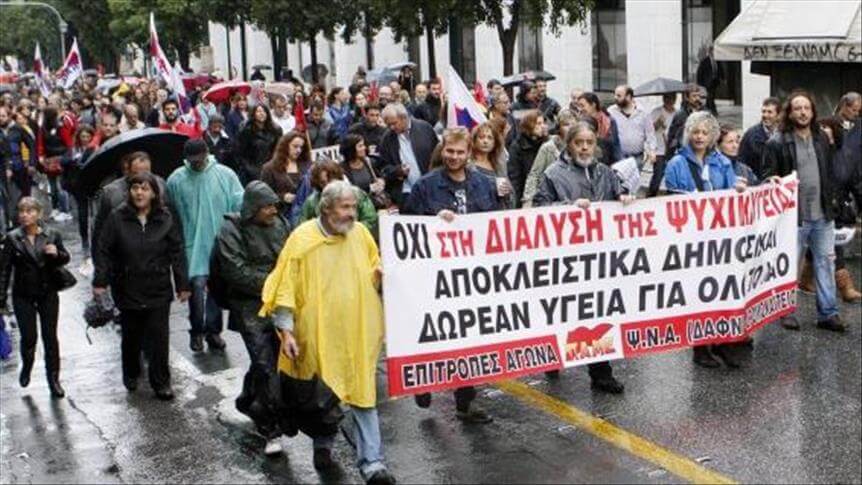Precarious work: Europe’s new reserve army
by Harald Schumann and Elisa Simantke
Oct. 25, 2017
Millions of Europeans in temporary, part-time or bogus self-employed contracts can only find insecure and badly paid jobs, despite the healthy economic climate. That is the price of deregulating labour markets, Investigate Europe reports. This precarious set of labour conditions was created intentionally.
The misery of bad jobs has many faces. It can take the form of work contracts without health or social insurance; it can be part-time jobs, which don’t pay enough to live on. Or those affected are kept dangling from one temporary contract to the next, or they have to eke out a living as bogus self-employed and contract workers (see examples). The methods vary from one country’s national legislation to that of another, but the outcome is always the same: millions of EU citizens have to get by with insecure and badly paid jobs, offering them no perspective – and this is a growing tendency. France’s President Emmanuel Macron wants to enhance the trend still further. In future, his government will permit employers to hire workers for individual projects only – on contracts which can be cancelled at any time. This often coincides with the dismantling of nationally valid collective agreements, which up to now have offered protection against such practices.
And this is at a time when Europe’s economy is in the best shape it has been for 10 years. In the euro zone alone five and a half million people have found new work since the end of 2012. But according to data provided by Eurostat, the statistical office of the European Union, four out of five of these new jobs are only part-time or temporary and mostly they are badly paid. At the same time, two-thirds of those affected would like to have permanent, full-time jobs, the EU Commission confirms in its latest report on the EU labour market. Europe’s supposed boom is “of low quality”, concluded the research department of US bank Merrill Lynch.
It affects young people above all (see graph). Nearly half of employees up to the age of 25 are employed on temporary contracts, in Spain this figure is even more than 70 percent. “That is very problematic,” says Marianne Thyssen, EU Commissioner for Employment and Social Affairs. “It prevents them leaving their parents’ house, they cannot buy a home or make any decisions, and that weakens the entire economy,” warns the conservative EU politician from Belgium. “People in insecure jobs do not invest in their skills nor do their employers,” she explains. “The more precarious jobs there are, the less productive the economy is,” says Ms. Thyssen, and she is in agreement here with eminent economists. “All these insecure forms of work are extremely expensive – both for those affected and for society as a whole,” says, for example, Olivier Blanchard, the long-standing chief economist of the International Monetary Fund.
But why has job insecurity reached such levels? And what has to happen to halt the trend? The team from Investigate Europe has looked into these issues, and the findings are sobering indeed. In their regulation of labour markets:
– European governments and the EU Commission have been following assumptions and theories for years, which have been shown to be wrong and unrealistic;
– Commissioners and finance ministers of the euro group have systematically dismantled or weakened collective bargaining agreements, fought against trade unions and, by doing so, promoted inequality and job insecurity;
– EU countries are now caught up in a race to the bottom with regard to wages and employees’ rights, making national solutions more difficult.
The keyword for this development is “flexibility”, explains the French trade unionist Thibault Weber, an academic business economist who is the expert in such matters on the board of the European Trade Union Confederation. Europe’s economic policymakers are “obsessed with the idea that the labour market is a market like any other and therefore has to be made as flexible as possible”, says Mr. Weber. But that means enabling companies to employ workers at their own discretion according to the market situation and as cheaply as possible – in other words, employees are the losers. Labour market policies are following this maxim all over Europe, according to Mr. Weber, and “precariousness is the logical result.”
There has indeed been a wave of deregulation affecting EU countries’ labour laws over the last two decades or so, and it continues to this day. Just since 2008 the International Labour Organisation (ILO) has counted more than 400 changes of national labour market rules. And most of these structural reforms, as they are called in economists’ jargon, follow the same recipe: if workers are sufficiently flexible and cheap, then companies create new jobs, unemployment falls, and the economy grows.
That was also the logic behind the so-called “Agenda 2010”, with which the government of former Federal Chancellor Gerhard Schröder sought to break up what he called “ossified structures” in the labour market.Indeed, Mr. Schröder used the words “flexibility” and “making flexible” no fewer than eight times during his government declaration on the subject in March 2003. And so temporary employment was “freed of bureaucratic restrictions”, and the upper limit for temporary work at start-ups was extended to 4 years. Low-wage and mini jobs were given favourable treatment by the taxman, and the unemployed were forced to accept any job offer, no matter how badly paid. Parallel to this, countless companies opted out of collective wage agreements and used contract workers, part-time and temporary workers to push down their wage bills.
To this day, this is seen all over Europe as a big success. The unemployment rate fell to its lowest level since reunification. That is why politicians in other European countries like to point to the German model when they want to further deregulate their domestic labour market. Chancellor Merkel also likes to extol the virtues of German “reforms”. It was only after these reforms that Germany “was able to pull away from France,“ Ms. Merkel claimed last May.
But the story of the German jobs miracle is misleading. It is true that the number of people in employment increased by more than 10 percent between 2003 and the end of 2016 from 39 to 43 million. But this was achieved mainly by replacing full-time jobs by part-time and mini jobs. In fact, actual working time did not increase at all up to 2010; the work was just spread over more people.” And also since the economic climate improved in 2011, the volume of work has been growing much more slowly than employment and is still below the levels of the early 1990s. And that is why in 2016, 4.8 million people in Germany were living entirely from mini jobs. A further 1.5 million are working against their will in part-time jobs. And then there are around 1 million contract workers and more than 2 million self-employed without employees, and most of them do not have enough work.
The “industrial reserve army“ of the unemployed, as Karl Marx once called them, “was reduced in size at the price of a growth in the reserve army of the under-employed in part-time work and the over-employed who have to do several jobs to get by.” That is how the economic sociologist Oliver Nachtwey, author of the bestseller “The Decline Society”, describes the result.
The so-called German miracle thus condemned millions to a life on the poverty line. That means they have to get by on less than 60 percent of average income, about €1,070 per month. Despite the high rate of employment this proportion of the population has been growing for 18 years and has now reached 16 percent. And even a large proportion of those in full-time employment have been left behind. After deductions for inflation, the lower 40 percent of wage earners in Germany earned in 2016 less than they did 20 years ago, as the federal government had to concede in a report on poverty and affluence. And that is why the “Financial Times” called the German miracle “just a myth”.
However, the real strength of the German model was shown in 2009 during the recession, following the Lehman crash the year before Whereas many millions of people all over the world lost their jobs, German companies switched to short-time work, reduced their employees’ working hours by drawing down their internal work time accounts filled with overtime worked before and with supporting payment by the unemployment insurance, so there were hardly any job losses. When the economic climate improved again, they were easily able to ramp up their production and increase their market share. “So it was the exact opposite of the external flexibility dogma,” of the Schröder agenda, “which saved the German labour market in the crisis,” concludes the economist Stefan Lehndorf of the Institute for Labour and Qualification at the University of Duisburg. “Internal flexibility,” negotiated with and not against the workforce, prevented unemployment. In that respect, he says it is a “bitter irony” that Germany to this day is held up as a role model “for the wrong reasons.”
However, the misunderstanding led to an increase in profitability because of reduced wage bills. This is how the concept of the flexible employee became a powerful doctrine. In Spain short-term contracts of a few months became the rule, the Netherlands made their workers more flexible with variable part-time contracts, and in Italy bogus self-employed status became the norm after liberal professions like lawyers and architects were “opened up to competition” in 2006 and tariff regulations were abolished.
Job security became most precarious in Poland. To make the country attractive to international investors after EU entry, the government in Warsaw added a particular attraction to fixed-term contracts in 2004: anyone who was only employed for a fixed period anyway, could be dismissed at any time without any reason being given. At the same time, there was a massive expansion of employment limited to specific projects and anchored in civil law. Those affected are denied not just social and health insurance, but also the legal minimum wage.
Many employers, from global concerns to small businesses, make use of this. That is why today more than a third of all Polish employees work without any security or for poverty wages – more than in any other EU country. Poland’s labour laws are a “throw-back to the 19th century,” is the indignant reaction of Adam Rogalewski, the Europe Secretary of the Polish trade union confederation OPZZ.
Poland is not alone here. As the financial crisis drove many EU countries into recession and caused big increases in debt and unemployment, the deregulation of labour law became the wonder weapon of choice for the EU Commission – at the time under the leadership of the economic liberal José Barroso and the euro zone’s finance ministers. Global economist Olivier Blanchard, research boss of the IMF at the time, thought it was strange. “Structural reforms were no big deal up to 2009,” he remembers. But they suddenly became “a slogan” to be heard at every conference. “There was this view that weaker trade unions and more wage flexibility were the way out of the crisis, and it was expounded like a religious creed,” he remembers. And of course “this was a way for finance ministers and central banks to put the burden on others,” says Mr. Blanchard.
Then Mr. Barroso’s Economics Commissioner, the Finn Oli Rehn, called on crisis-hit countries to pursue “flexible wage determination and offer more incentives for the unemployed to find work.” Parallel to this, Central Bank boss Mario Draghi put the governments of Spain and Italy under pressure. In order to win back their creditworthiness, they should “reform the system for negotiating wage agreements and approve agreements at the level of individual companies in order to adapt wages and working conditions to their specific requirements,” he wrote to Rome. And he required of Spain that it “take measures to reduce wages in the private sector” and to permit employment contracts “which pay very low compensation in the case of dismissal.”
Mr. Rehn’s officials then stipulated in a “report on the development of the labour market“, what exactly constituted “employment-friendly” reforms. According to the report they were conditions which:
– “loosen the conditions for dismissals,”;
– “increase the maximum duration of fixed-term and temporary contracts and the
maximum number of renewals”;
– “decrease the bargaining coverage or extension of collective agreements” and
– “result in an overall reduction in the wage-setting power of trade unions.”
Just how blatantly Europe’s governing politicians pursued the interests of managers and company owners with this agenda, was particularly apparent in the crisis-hit countries of Portugal, Greece and Romania. The latter countries’ governments were dependent on emergency loans from the other euro states and the IMF. The officials of the appointed “Troika” from the Commission, the IMF and the ECB used this – on behalf of the creditors – to make radical changes to existing labour and collective bargaining laws in order to benefit employers.
Suitable proposals were made in October 2011, for example, by Pierre Deleplanque, boss of the cement manufacturer “Heracles”, the Greek subsidiary of the world’s largest building materials group Lafarge. After a private meeting with the Troika officials the company manager sent his demands to the head of the Athens office of the IMF, as reported by the newspaper “Efimerida ton Syntakton”, the Greek media partner of Investigate Europe. In his demands, marked “Confidential, only for internal use,” the company manager explained that in addition to “suspending industry wage agreements” the validity of old wage agreements with big companies would also have to end, “in order to facilitate individual agreements” – and in this way remove every protection from employees.
And that is exactly what happened. The loan contracts, called “memoranda of understanding” stipulated that, from then on, employees could be dismissed and were only entitled to minimal compensation. At the same time, national or branch wage agreements which had been the norm up to then, were abolished. Negotiations today are nearly all at company level and usually conducted directly with employees. The new laws “gave employers the power to make unilateral decisions,” as the “conversion of full-time contracts to non-standard employment contracts illustrated,” reported social scientists from the University of Manchester in a subsequent study, ironically financed by the EU Commission. According to the study countless permanent contracts have been changed into fixed term, part-time employment contracts since 2011 and in four out of five cases without the agreement of the individuals affected. Making jobs insecure was the programme, and wages fell on average by 23 percent.
The enforced end of wage negotiations contravened the UN Convention on labour rights, according to a finding of the UN labour organization ILO. But this didn’t bother the EU Commission . On the contrary, its officials implemented the same radical reform in Portugal too. There they stopped the expansion of centrally colectively bargained contracts which included all companies of a branch of industry – a practice which had been usual up until then. It was a resounding success. Up to 2008, around 45 percent of all Portuguese employees’ contracts were based on a nationwide applicable branch agreement. Six years later, that figure was just 5 percent.
In Romania EU officials even exceeded their legal mandate in order to implement radical market ideas. When they made it a condition for granting an emergency loan from 2009 to “streamline institutions for wage determination,” they were directly serving the interests of international concerns. “The Council of Foreign Investors and the US Chamber of Commerce were involved in the drafting of new labour laws and very happy (to do so), says the social scientist Aurora Trif of Dublin University, which surveyed the players involved for an EU-financed study. They made no secret of their influence on the legislation, according to Ms. Trif.
What resulted was a labour law which allowed companies to place employees with full-time contracts on part-time, to issue new employment contracts only on a fixed-term basis and to make use of unlimited numbers of contract workers. At the same time, the government under the aegis of the EU Commission abolished national collective bargaining and the negotiation of new contracts was to be at the discretion of employers.
The collective bargaining system which had been valid up until then, and which applied to 90 percent of all employees, “was practically destroyed,” complains Petru Dandea, general secretary of the trade union confederation Cartel Alfa. Elected trade union representatives also lost their right to protection against dismissal, as did any employees who dare to strike.
As a consequence of the draconian reform wages fell so far that now 40 percent of all employees are paid only the legal minimum wage. “We are paid as if we were a country of unqualified people,” complains trade unionist Mr. Dandea.
The EU Commission took that into account at the time. When a subsequent administration in Bucharest announced in 2012 that it would again facilitate nationally binding wage agreements, officials of the commissioner responsible at the time, Olli Rehn, vetoed the move together with the IMF. “ We strongly urge the authorities to ensure that national collective agreements do not contain elements related to wages and/or reverse the progress achieved with the Labor Code adopted in May 2011,” they wrote to the government – in full agreement with the American Chamber of Commerce, which sent a similar letter of protest. This prompted the government to abandon the plan.
With this intervention however, Mr. Rehn and his officials were usurping a right they did not have. Article 153 of the EU Contract states explicitly that the EU and its organs have no responsibility “for pay” whatsoever. Today Mr. Rehn sits on the board of the Finnish central bank. He is unwilling to talk about his involvement in the labour law of other countries and declined to give an interview. The former finance minister of the Netherlands, Jeroen Dijsselbloem, who as chairman of the euro group supervised the way to precariousness in Greece and Portugal, also did not wish to be interviewed.
For a good reason perhaps. Because it has long been clear that “structural reforms” which penalise employees achieve no measurable success for the economy.„Labor market regulation is not found to have statistically significant effects on productivity“ as confirmed by the IMF, the world‘s leading institution for economic research in its annual report of 2015. Even the traditionally market-liberal economists of the OECD, the club of wealthy countries, conceded last year: “Most empirical studies investigating effects of flexibility-enhancing EPL reforms suggest that they have, at worst no, or a limited positive impact on employment levels.”
A study published in May by the “European Trade Union Institute” (ETUI), the think tank of EU trade unions, examined this question on the basis of comprehensive surveys from eight countries, including Spain, Poland and Germany. These data produced “a very clear result,” says Martin Myant, head economist of the ETUI. There was “no empirical proof” that “deregulation” had “increased employment or reduced unemployment for certain groups.” However, the reforms were “accompanied by an increase of precarious employment, particularly in the countries where there had been particularly energetic deregulation,” as proven by Mr. Myant and his colleagues.
Even ECB President Mario Draghi, who once urged Spain and Italy to exercise wage restraint and weaken trade unions, is now plagued by doubt. Because now the economy is growing but not wages. This means that inflation remains so low that Mr. Draghi and his colleagues do not dare to restore interest rates to customary levels. “Wage and price setting behaviour in the euro area have changed during the crisis”, Draghi said recently. “For example, structural reforms that have increased firm-level wage bargaining may have made wages more flexible downwards but not necessarily upwards”, he complained.
This mechanism has an enormous inherent risk: the unsuccessful reforms have entangled EU countries in a race to the bottom for wages and working conditions. The next round is due to begin in France. There are still fewer people in France than in other EU countries trapped in insecure and badly paid jobs. French employers see this as a disadvantage and are pushing for “decentralization” of wage negotiations and flexible employment contracts. President Emmanuel Macron is now delivering just such a “pro-business” reform, as the Financial Times put it.
Although “there is practically no proof that a liberalisation of the labour market in France will increase employment levels,” warned the Harvard economist Dani Rodrik. But that doesn’t bother Mr. Macron and his advisers. In future, employees and managers are to negotiate directly at company level, and the government has decided to abolish the application of national collective agreements which has been legally guaranteed up to now. “We are giving employees and employers the freedom to organise themselves,” explained the leading official of the Labour Ministry and Mr. Macron’s chief architect of the reform in an interview with Investigate Europe. He did not wish to be named. Mr. Macron’s technocrat denies that it is all about reducing wage costs, although that was exactly the consequence of such reforms in Spain or Portugal.
At the same time, the Macron government is clearing a further path towards precarious job security: in future, workers can be hired for a “projet des chantiers” (contract work) formally without a time limit, but in effect limited to a project and therefore easily dismiss. .
That is how France is heading for further job insecurity, although the opposite would be necessary. “If we want to deal with growing inequality, then a ‘re-regulation’ of labour laws would be required, to strengthen the negotiating position of employees again, says, for example, Gustav Horn, head of the trade union-linked German Institute for Macroeconomics (IMK). “Precarious jobs must not become the norm,” is also the opinion of Marianne Thyssen, the commissioner for employment and social affairs in Brussels, who wants nothing more to do with the authority’s former deregulation policies.
One possible instrument would be to significantly increase employers’ social security contributions in the case of fixed-term contracts. After all, the people affected have to draw unemployment benefit much more often than others. So it would only be logical for companies to pay the costs of employing workers “flexibly”. “We don’t want any ‘freeriders in the social systems’,” criticises Commissioner Thyssen.
But that would only be a first step. It would also be necessary to reform the basic principle of labour laws, demands Claudio Treves, general secretary for the liberal professions at the Italian trade union confederation CGIL. Instead of regulating the many different contract forms which exist in the EU, the aim should be to create “a European charter of employees’ basic rights”, which guarantees every worker the right to health and pension insurance as well as a minimum living wage, no matter what contract he or she has. This demand has already been signed by 1.3 million people in Italy, reports Mr. Treves.
But the new advocates of job security do not yet have the political power to enforce something like this. Only very few of the people with precarious jobs are trade union members. But that could change soon, because digitisation is escalating job insecurity to a new level: companies of the new platform economy like Uber, Foodora or Amazon circumvent labour laws on a broad scale, and their employees generally have no social safeguards, no works councils and no protection against dismissal. However, many of those affected are no longer prepared to put up with this state of affairs.











